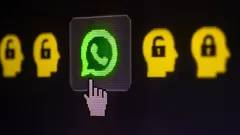
Jack Dorsey, the entrepreneur behind Twitter, is once again stirring the tech world. This time, he’s on a mission to revolutionize how we communicate through a brand-new messenger application that promises to flip the rules of privacy and control online. If you’ve ever wondered whether your conversations are as private as you think, this latest project could change your perspective—and could be the future of messaging.
A New Challenger to WhatsApp Emerges
For a long time, WhatsApp has been the preferred platform for communication, with over two billion users around the world. But recent privacy concerns have left many questioning the security of their messages. Dorsey’s brand-new platform is designed to put you in control of your personal data. In contrast to WhatsApp, which stores your data on central servers, the new messaging app promises a complete shift toward decentralized and encrypted communications, providing users with an entirely different experience.
The Vision: Privacy, Control, and No More Phone Numbers
Imagine an online messenger application where your phone number isn’t the only thing that matters. Dorsey’s newest platform, believed to be dubbed “Iris”—plans to allow users to sign up without tying their identity to a specific phone or device. Instead, users are given an individual digital identity that improves security and allows them to remain completely anonymous if they wish. It’s a bold move in an age when privacy is often seen as unrealistic.
Core Features: What Makes It Stand Out?
- End-to-End encryption by default, ensuring your chats are only between you and your contacts.
- Open-source code allows external experts to examine and test the application's security.
- No connection to phone numbers, offering greater security compared to standard messaging apps.
- A decentralized infrastructure, meaning there’s no central server harvesting your data.
"We believe everyone should own their connections and conversations online—not a corporation."
Recent studies have shown that 72 percent of Americans are concerned about the privacy of personal information while using messaging apps. Dorsey’s initiative directly addresses this concern by eliminating the reliance on phone numbers and providing transparency through open-source development.
Technological Innovation and User Empowerment
Traditional messengers, such as WhatsApp or Messenger, store data on large corporate servers. However, with Iris, your chat history and contacts are kept on your device or with the people you choose. No tech giants can access the data. This is due to the peer-to-peer network that directly shares data, making hacking or surveillance extremely difficult.
Potential Networks for Early Adopters
Dorsey’s emphasis on open source and a community-driven design means anyone, from privacy advocates to developers, can shape the app’s evolution. Tech-savvy users are already excited about modifying features and developing plugins to meet real-world needs. It's refreshing to see major tech companies tackling issues like surveillance and data overreach head-on.
Looking Ahead: What Could Change for You?
With the rising popularity of encrypted applications and mounting concerns about cybersecurity, a service like Iris could set a new standard for private communications. If you’re tired of being tracked online, this innovative messenger application offers a unique solution. As technology in the US increasingly demands stronger protection, the success of Iris could push existing networks to adopt stronger security measures.
Privacy-first messaging isn’t just a trend—it’s becoming a necessity. If you’ve ever searched for “best private messenger apps for Americans,” you know how difficult it can be to find one that truly delivers. Dorsey’s bold move is sure to spark new competition, which is great news for anyone concerned about keeping their conversations completely private.
 W3 CodeCraft
W3 CodeCraft















Comments